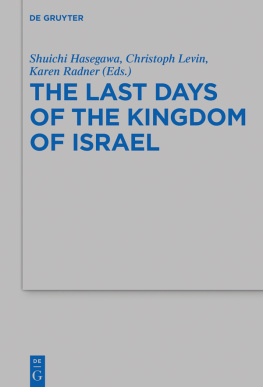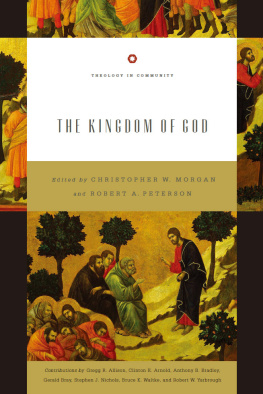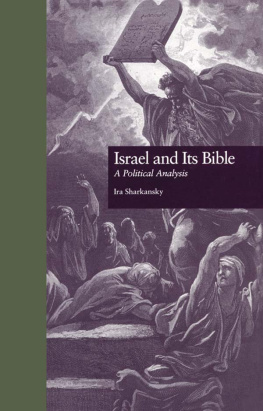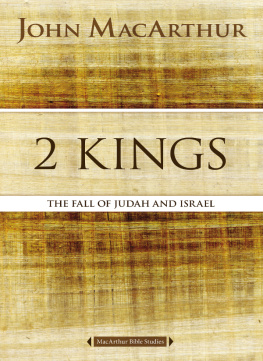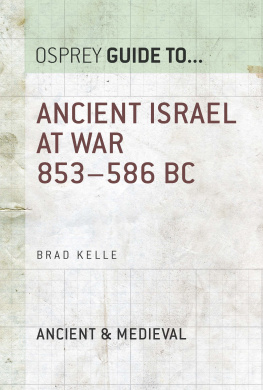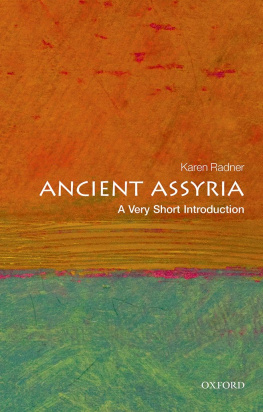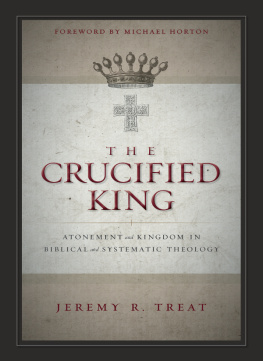Table of Contents
Guide

The Last Days of the Kingdom of Israel
Beihefte zur Zeitschrift
fr die alttestamentliche
Wissenschaft

Herausgegeben von
John Barton, Reinhard G. Kratz, Nathan MacDonald,
Carol A. Newsom and Markus Witte
Band 511
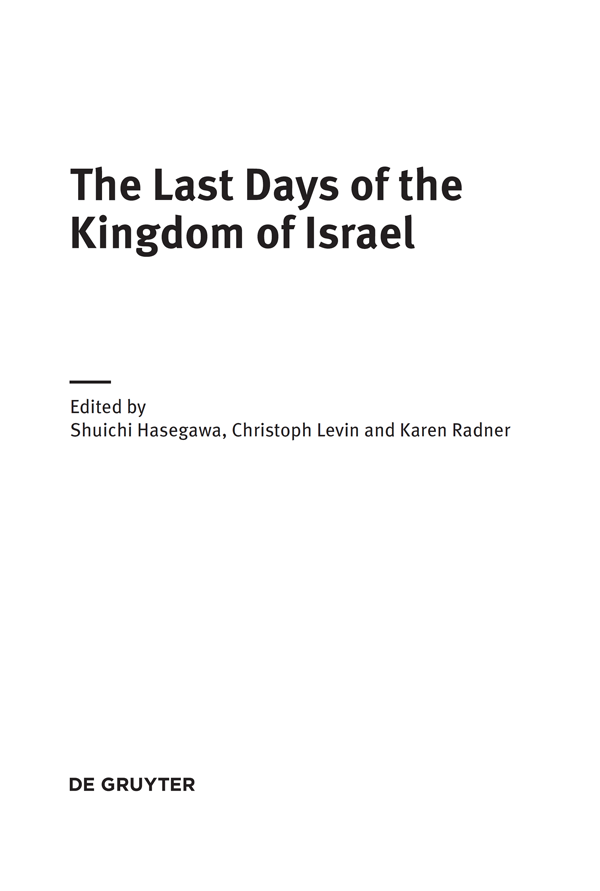
ISBN 978-3-11-056416-7
e-ISBN (PDF) 978-3-11-056660-4
e-ISBN (EPUB) 978-3-11-056418-1
ISSN 0934-2575
Library of Congress Cataloging-in-Publication Data
Names: Hasegawa, Shuichi, 1971- editor. | Levin, Christoph, 1950- editor. | Radner, Karen, editor.
Title: The last days of the Kingdom of Israel / edited by Shuichi Hasegawa, Christoph Levin, Karen Radner.
Description: First edition. | Berlin; Boston : Walter de Gruyter, [2018] | Series: Beihefte zur Zeitschrift fur die alttestamentliche Wissenschaft, ISSN 0934-2575 ; Band 511
Identifiers: LCCN 2018023384 | ISBN 9783110564167
Subjects: LCSH: Jews--History--953-586 B.C. | Assyria--History. | Bible. Old Testament--Criticism, interpretation, etc. | Assyro-Babylonian literature--History and criticism.
Classification: LCC DS121.6 .L37 2018 | DDC 933/.03--dc23 LC record available at https://lccn.loc.gov/2018023384
Bibliografische Information der Deutschen Nationalbibliothek
The Deutsche Nationalbibliothek lists this publication in the Deutsche Nationalbibliografie; detailed bibliografic data are available on the Internet at http://dnb.dnb.de.
2019 Walter de Gruyter GmbH, Berlin/Boston
www.degruyter.com
Shuichi Hasegawa
The Last Days of the Northern Kingdom of Israel
Introducing the Proceedings of a Multi-Disciplinary Conference
1 The Conference
The Northern Kingdom of Israel ruled the northern part of the Southern Levant for about 200 years from the mid-tenth century to the late eighth century BCE. The kingdom was conquered by the Assyrian Empire after the latter had persistently conducted military campaigns into the Levant from the mid-ninth century BCE onwards.
Despite considerable scholarly efforts over many years, the events of the last three decades of the Northern Kingdom of Israel are still hidden beneath the veil of history. A number of questions remain unresolved: the status of the kingdom after Tiglath-pileser III, king of Assyria, annexed its larger part in 732 BCE; the date of the conquest and the identity of the conqueror of Samaria, the capital of the kingdom; the fate of Hoshea, the Northern Kingdoms last king; or the circumstances under which Samaria joined the anti-Assyrian coalition after its fall. One of the primary reasons for this situation lies in the discrepancies to be found in the available textual sources, namely the Hebrew Bible (chiefly, Book of Kings, Isaiah and Hosea) and the Assyrian material, most importantly royal inscriptions and letters from the state correspondence. The gaps in the sources are not easy to bridge, also because Bible Studies and Assyriology are separate disciplines with distinct agendas and methodologies.
In the period in question, the Northern Kingdom played a significant role within and beyond the Levant. Elucidating its fall is not only critical for reconstructing the history of the kingdom itself, but can also contribute greatly to our understanding of biblical and ancient Near Eastern historiography, for it is extremely rare that the textual sources both of the conqueror and of the conquered are at our disposal. In addition, the modern state of Israel is the most exhaustively and most intensively excavated region in the Middle East, and this provides us with much relevant archaeological information. To investigate the period in question is also meaningful in order to reconstruct Assyrias diplomatic and military strategies toward its client kingdoms and its policies in its administrative provinces. Our topic serves to elucidate the structure of imperial domination of this first empire of the ancient Near East, and to determine the difference in its treatment between the Northern Kingdom of Israel and the Southern Kingdom of Judah, which persisted as an Assyrian client state and was never integrated into the Assyrian provincial system.
To be in any position to attempt to reconstruct what really happened in the last days of the Northern Kingdom, one must first analyse all these sources critically and independently, and only then move on to synthesizing the results. Only in this way, do we stand a chance to elucidate the background, the course, and the results of the Syro-Ephraimite War, and to determine the date of the fall of Samaria, the identity of its conqueror and the aftermath of the conquest. The critical analysis of the available sources was therefore the remit of the conference The Last Days of the Northern Kingdom of Israel, whose proceedings constitute the present volume.
The multi-disciplinary conference was organized by Shuichi Hasegawa (Rikkyo University Tokyo), Christoph Levin and Karen Radner (both LMU Munich) in order to elucidate The Last Days of the Northern Kingdom of Israel and to explore with fresh eyes key issues connected with the Fall of Samaria and its narrative that have fuelled scholarly debates since the 19 th century. It was held at the building of the Carl Friedrich von Siemens Stiftung in Munich from 1517 March 2017 and brought together speakers from Finland, Germany, Israel, Italy, Japan, the Netherlands, the United Kingdom and the United States. It received generous funding from a Fostering Joint International Research grant of the Japan Society for the Promotion of Science (KAKENHI; Subject No. 15KK0061) awarded to Hasegawa, with additional financial support provided by the Carl Friedrich von Siemens Stiftung and the Alexander von Humboldt Foundation, the latter through the Alexander von Humboldt chair in the Ancient History of the Near and Middle East held by Radner (who hosted Hasegawa at LMU Munich during the academic year 2016/17). We wish to thank Denise Bolton for carefully proof-reading and, where necessary, language-editing the contributions to this volume, Alexa Bartelmus and Nikola Wenner for compiling the index and De Gruyter's Sabina Dabrowski, Katrin Mittmann and Sophie Wagenhofer for their support, care and speed in preparing this publication.
2 Introducing the Sources
It will be helpful to offer a short summary of the types and nature of the available sources and to briefly highlight the problems relating to them. I will use the following categories: (1) extra-biblical sources; (2) biblical sources; and (3) archaeological data.
2.1 Extra-Biblical Sources
Part II of this volume is devoted to this material which includes (1) Assyrian royal inscriptions, (2) the Assyrian Eponym Chronicle, (3) the Babylonian Chronicles, and (4) various Assyrian archival texts.
2.1.1 Assyrian Royal Inscriptions
In the second half of the eighth century BCE, the rulers of the Assyrian Empire conducted a number of military campaigns into the Levant and recorded accounts of these campaigns in their royal annals and other official inscriptions. These mention information such as the names of the kings of the Northern Kingdom, their tribute, and details of the Assyrian campaigns against the kingdom. The significance of these inscriptions lies in the fact that they were composed shortly after the time of the described events.

